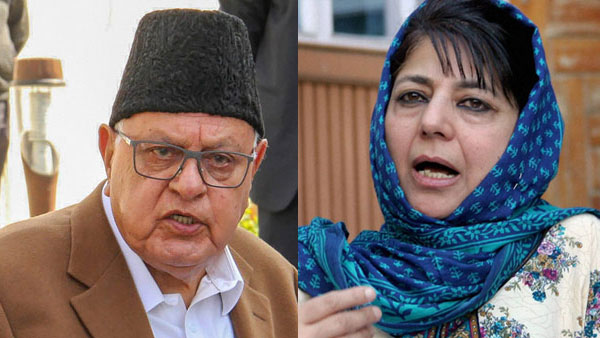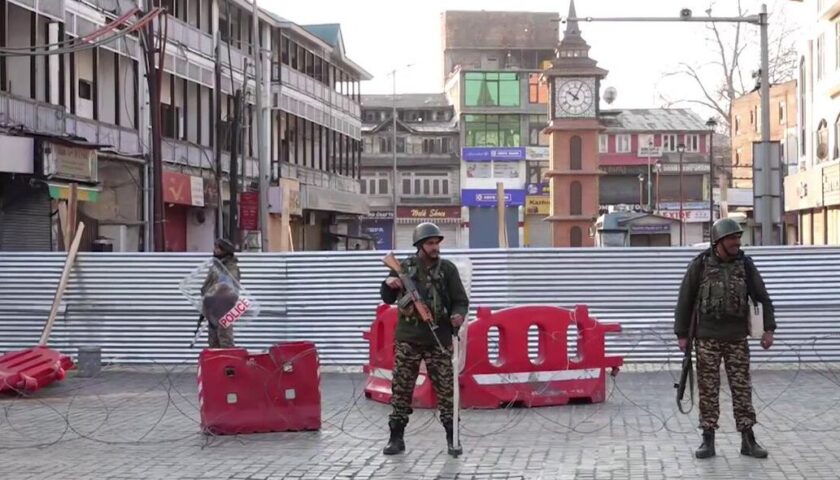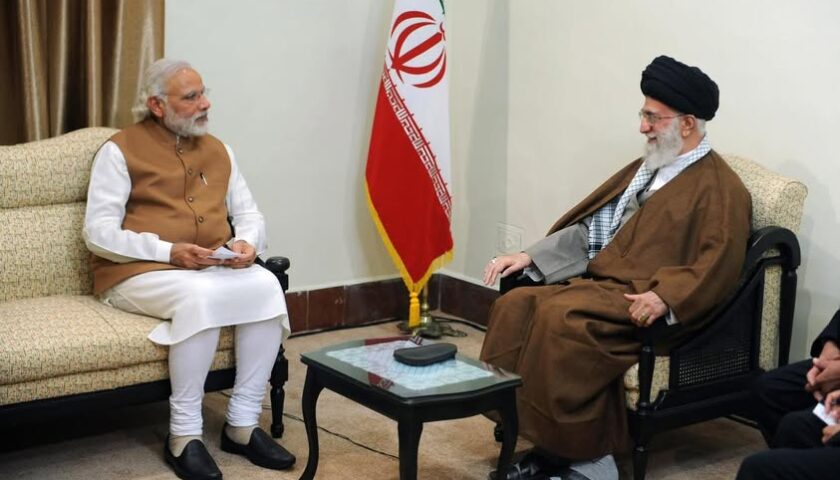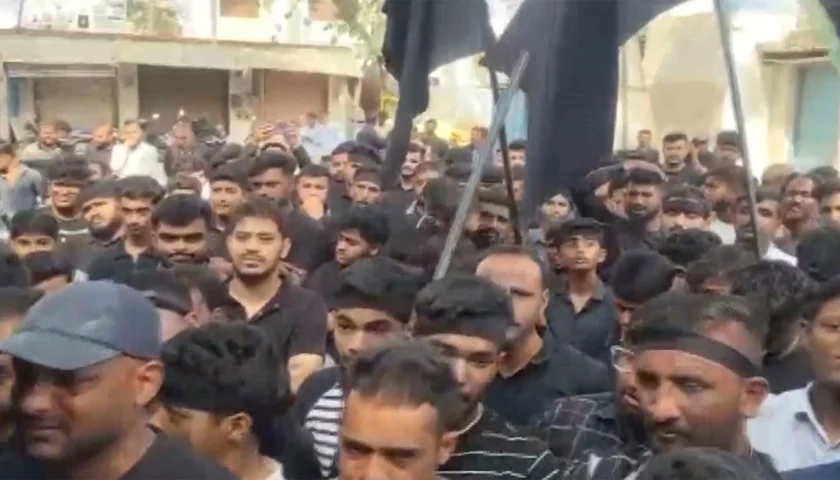A New Equation in Old Rivalries
By: Javid Amin | 22 October 2025
The political chessboard of Jammu & Kashmir has once again shifted. The National Conference (NC), led by Dr. Farooq Abdullah and Chief Minister Omar Abdullah, has reached out to its long-time rival, the People’s Democratic Party (PDP), for crucial support in the upcoming Rajya Sabha elections.
The goal is straightforward — to secure a clean sweep of all four Rajya Sabha seats from the Union Territory. But beneath the surface, the talks signal something more profound: the reemergence of regional pragmatism over partisan rivalry, with land rights and employment guarantees forming the heart of a potential power pact.
The Tactical Outreach: Omar Meets Mehbooba
According to senior party insiders, discreet meetings between Omar Abdullah and Mehbooba Mufti have already taken place in Srinagar and Jammu, setting the tone for what could become the first meaningful NC–PDP understanding since the 2014 assembly elections.
While the two parties have historically been bitter rivals — divided by ideology, governance style, and their approach toward New Delhi — recent developments suggest both now recognize the political necessity of collaboration in a post-Article 370 J&K.
“Pro-people legislation must come first,” Mehbooba reportedly told NC negotiators during an informal discussion last week. Her message, party aides say, was clear: support is not unconditional.
PDP’s Core Demands: Land and Livelihood
At the center of PDP’s bargaining position are two deeply emotive issues that resonate across Kashmir:
-
Land Rights Bill — a proposed legislation aimed at safeguarding local land ownership and reversing post-2019 policy changes that allowed non-locals to buy land in the region.
The PDP insists that any alliance with NC must translate into tangible legal protection for native landholders, echoing the party’s foundational promise of “Kashmir for Kashmiris.” -
Regularisation of Daily Wagers — a social and economic demand that has long defined local politics.
With thousands of contractual and daily-wage workers awaiting job security for over a decade, the PDP views this as a moral and political imperative.
“People want legislation, not slogans,” a senior PDP functionary said, hinting that legislative reform — not electoral arithmetic — will decide the contours of any agreement.
The Numbers Game: PDP’s Leverage in the Upper House
The NC currently holds a comfortable majority to win two of the four Rajya Sabha seats on its own strength. However, to secure the remaining two seats — and effectively block the Bharatiya Janata Party (BJP) from gaining a foothold — the PDP’s votes become decisive.
The People’s Conference (PC), led by Sajad Lone, has reportedly declined to support NC, viewing the move as “ideologically inconsistent.” This has elevated the PDP’s importance in the balance of power.
A senior NC strategist admitted, “We cannot underestimate Mehbooba’s position. Even symbolic support from PDP could alter the BJP’s calculations.”
BJP’s Counter-Strategy: Playing the Numbers and the Narrative
For the BJP, the Rajya Sabha elections present an opportunity to project relevance in a region where its legislative influence remains limited. Party insiders in Jammu confirmed that the BJP plans to contest three of the four seats, banking on support from smaller independents and defectors.
The party has also launched a counter-narrative, accusing the NC and PDP of “colluding to protect dynastic privileges” under the guise of regional unity.
“Two families cannot decide the future of Jammu & Kashmir,” said a BJP spokesperson, referring to the Abdullahs and the Muftis — a refrain that continues to define the party’s political messaging in the Valley.
Land Rights at the Core: The Emotional and Political Undercurrent
The Land Rights Bill has emerged as the most potent symbol of local assertion since the abrogation of Article 370 in August 2019. While the NC has maintained a cautious tone — promising “review and reform” rather than repeal — the PDP has taken a more definitive pro-restoration stance.
For Mehbooba Mufti, the issue is deeply tied to identity, dignity, and local empowerment.
For Omar Abdullah, it represents governance pragmatism — balancing economic openness with social protection.
Analysts view the emerging NC–PDP understanding as a regional counterweight to the BJP’s centralising policies, one that could restore some autonomy in decision-making, at least symbolically, through legislative assertion.
The Ghost of Past Rivalries
Despite the talks, old wounds remain fresh. The PDP still recalls the 2018 collapse of its coalition government with the BJP — an episode that profoundly altered the political landscape.
The NC, on the other hand, has not forgotten the 2016 unrest and Mehbooba’s alliance with the BJP, which the Abdullahs frequently cite as a “political betrayal.”
Yet, both sides now appear willing to set aside ideological differences in pursuit of strategic survival — a hallmark of Kashmir’s political pragmatism.
“Politics in J&K has always been about timing,” says political analyst Noor Ahmad Baba. “When survival and relevance align, even rivals find common ground.”
Coalition or Convenience?
The possible NC–PDP understanding raises important questions:
-
Will this tactical cooperation evolve into a legislative alliance beyond the Rajya Sabha polls?
-
Can the two parties jointly push pro-people legislation without reopening old wounds?
-
Or will this be another temporary truce, driven by numbers rather than vision?
In Kashmir’s unpredictable political theatre, alliances are rarely permanent, but they often set the tone for future realignments.
Public Sentiment: Between Hope and Skepticism
Among voters, reactions are mixed. Civil society groups have cautiously welcomed the idea of regional parties uniting for people’s welfare, especially on land and employment issues.
However, ordinary citizens express fatigue over what they see as recycled promises.
“Every election, they talk about land, jobs, and rights — but little changes on the ground,” says Bilal Ahmad, a shopkeeper in Pulwama.
This sentiment underscores the trust deficit between political elites and the electorate — a challenge that both NC and PDP will have to confront if they hope to translate tactical gains into long-term legitimacy.
The Road Ahead
The Rajya Sabha elections, expected to be held later this year, could mark a turning point in J&K’s post-370 political evolution.
If the NC and PDP formalize their understanding, it would not only reshape the opposition arithmetic but also signal the return of regional assertion in the Union Territory’s political narrative.
Yet, as one senior journalist notes, “Every alliance in Kashmir comes with a question mark — not just of trust, but of purpose.”
Whether this new engagement between Omar Abdullah and Mehbooba Mufti will lead to substantive legislative reform or merely a temporary electoral understanding remains to be seen.
Bottom-Line: Between Pragmatism and Principle
In the intricate dance of J&K politics, pragmatism often trumps ideology. The ongoing talks between NC and PDP highlight a familiar theme — the fusion of necessity and strategy, where every handshake carries the weight of history and hesitation.
If land rights and livelihoods become the new foundation of cooperation, the alliance could redefine Kashmir’s legislative priorities for years to come.
But if the deal remains confined to numbers and seats, it may end up as just another chapter in Kashmir’s long chronicle of political compromises.




